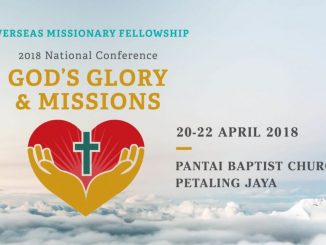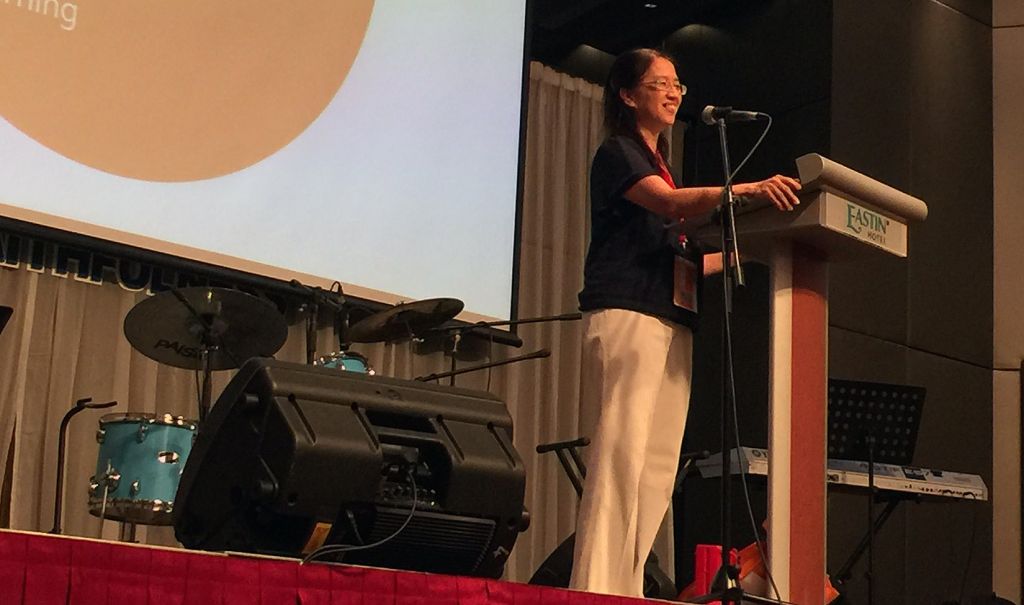
From 27th to 29th of November, OMF (Overseas Missionary Fellowship) held their annual missions conference at Eastin Hotel, Petaling Jaya. This year’s conference was particularly special, as they celebrated their 150th Anniversary.

Photo Credit: Johnny Ong
The conference kicked off on Friday afternoon with a message from Dr. Martin Goldsmith, one of the pioneering OMF missionaries in Malaysia. For Dr. Goldsmith and his wife Elizabeth, the celebration was not just for OMF’s 150 years, but their 50th anniversary of their arrival in Kluang where Dr. Goldsmith pastored Kluang Presbyterian Church.
Dr. Goldsmith began by sharing Psalm 77: 11-15.
11 I will remember the deeds of the Lord;
yes, I will remember your wonders of old.
12 I will ponder all your work,
and meditate on your mighty deeds.
13 Your way, O God, is holy.
What god is great like our God?
14 You are the God who works wonders;
you have made known your might among the peoples.
15 You with your arm redeemed your people,
the children of Jacob and Joseph.(Psalm 77:11-15)
He then went on to emphasize the importance of remembering God’s work and His faithfulness, even as they reminisce about OMF’s rich history. Dr. Goldsmith highlighted some events that took place in the earlier years of OMF, and how God pushed and challenged the missionaries to go to places they never imagined possible.
“As we remember some of the things that God has done for OMF in the past 150 years, we don’t just remember them in the sense of not forgetting our history. We also associate ourselves with the working of God with that history, and we bring that history into the present, and into the future, knowing that the Lord who has done those things is the same Lord with us today. We can be nostalgic about the past, but we bring the God of those events into today’s world—into our mission today.”

Photo Credit: Johnny Ong
OMF’s roots trace back to Hudson Taylor’s heart for the people of China in which he started CIM (China Inland Mission). The missionaries were doing a great work in reaching the Chinese, but when communism overtook China, it was only a matter of time before they were forced to leave the country.
It was then that their eyes were opened to see that there were many people of Chinese descent living outside of China. Thus the name China Inland Mission was changed to Overseas Missionary Fellowship—‘overseas’ being the Chinese people outside of China.
It was through this series of events that people like Dr. Martin Goldsmith and many other missionaries were led to South East Asia. Their ministry, that started off with a vision that was strictly for the Chinese-speaking Chinese eventually spread to other people groups and ethnicities who spoke other languages, including English!
“God worked in that way, moving the CIM out of China into all of these different countries, and what a blessing it has been,” Dr. Goldsmith said.

Photo Credit: Johnny Ong
Later that night during the anniversary dinner celebration, Dr. Patrick Fung, the general director of OMF International shared an encouraging message based on some of Hudson Taylor’s core principles, which remains part of OMF’s motto.
“Both you and I can still say of the past, Ebenezer; of the present, Jehovah Nissi; and of the future, Jehovah Jireh.”— James Hudson Taylor
“Watchwords (or mottos) are very important for an organization,” Dr. Fung said, “but watchwords hold no meaning if they form only a creed to be recited. No warrior is equipped by simply holding a sword. No man is made a scholar by simply giving him a book. No servant of God is made effective by simply reciting a mission statement.
“These watchwords only have meaning if each generation of OMF missionaries live by faith and experience God’s provision and help, and advance under God’s direction.”
Dr. Fung went on to elaborate on each of the three points, Jehovah Jireh, Ebenezer, and Jehovah Nissi.

Photo Credit: Johnny Ong
Jehovah Jireh: The Lord will provide
In Genesis 21, Sarah bears a son and says, “God has brought me laughter, and everyone who hears about this will laugh with me.”
As we read on, Abraham is given a surprising command to sacrifice that child of promise. Isaac said to his father, “The fire and wood are here, but where is the lamb?” and Abraham answered, “God Himself will provide the lamb for the burnt offering.”
When Abraham saw the ram God had provided, he called that place Jehovah Jireh (Genesis 22:14). This account had a great impact on Hudson Taylor, to which he said, “God’s work done in God’s way will never lack God’s supply.”

Photo Credit: Johnny Ong
“As in the days of CIM, we are still on a faith journey,” Dr. Fung said. “Many of us read Genesis 22 and say, ‘Yes, God will provide,’ but the focus there is not just on God. It also focuses on the servant who is willing to obey. It is both—the call of God who provides, and also one who obeyed the call.
“Today, as we look back, we also look forward. God has challenged OMF to obey and bring the Gospel to the people of East Asia. For the past 6 months we have been praying and thinking about what God wants us to do, and He has been laying on our hearts to look particularly at some of the still-neglected frontiers. The church is very vibrant in many places, but many places still do not have a single church. People need to hear the Gospel.
“We are also looking at Africa. We never dreamed that OMF would have work in Africa, but God has pushed us to expand. Today we have Malaysian missionaries working in Africa amongst Chinese prisoners because they speak the language.

Photo Credit: Johnny Ong
“God just opened the way! We used to think that East Asian people are in East Asia, but today, East Asians are everywhere. As we pray, God is challenging us to send workers, and we are trusting that He would provide.”
Ebenezer: Thus far, God has been our help
The Scriptures affirm the importance of remembrance. After Joshua led the people of Israel over the Jordan River, God told him to set up stones to remember that God is powerful and has helped them. Later in 1 Samuel 7, Samuel set up a stone between Mizpah and Shen to instruct the Israelites to remember the Lord’s help in their battle against the Philistines, and called it Ebenezer.
“As we look back over the past 150 years, God has been our help. But we do not just remember the times of spiritual breakthrough. We also remember times of trial and suffering. God never abandoned us. He was there when we went through difficult times.”
Dr. Fung then went on to share about how a tragedy killed five OMF missionaries and their seven children. A memorial service was held for them in Thailand, where these missionaries had been serving, and more than 700 people attended that service. The majority of them were not Christians.
An article was published a month later, and this was written:
“For 25 years, they had been [witnessing to a town in central Thailand] where there had been resistance and hardship. Perhaps, it would take a visual aid such as the loss of our beloved fellow laborers and their children to demonstrate the validity and reality of the gospel that we preach. We are praying that the fragrance of Jesus—the Savior of life unto life may pervade [all of central Thailand], and this loss of life by Satan—an act of desperation—will be the beginning of a breakthrough for the Gospel.”
“OMF cannot guarantee the safety and security of our members, but God can,” Dr. Fung said. “He alone is the Ebenezer. He only is our comfort and our source of security. And so as we look for workers for the neglected frontiers, as we reflect on where God is calling us, we are also praying for workers to go to what we now call the ‘engaged communities.’
“These are places we have been working in, but the church still needs help and strengthening. Not just church planting, but also strengthening. It is very powerful to see God at work among the churches. Not just us—it is never just OMF. It is always with the churches. We are now in a stage of journeying together.”

Photo Credit: Johnny Ong
Jehovah Nissi: The Lord is my Banner
After the very first battle where the people of Israel won the war through prayer, Moses built an altar and called it, “The Lord is my Banner” (Exodus 17:15). “God is leading. Let us be very careful,” Dr. Fung cautioned. “God is not just the banner of OMF, but of His people. So to go forward does not mean that we are doing it alone, leading all the time.
“One of the core values of OMF is the indigenous principle—or what Hudson Taylor called the “scaffolding.” Our purpose is to build the church of Jesus Christ. OMF is only the scaffolding structure. It can be taken away. I think of the three key words of OMF: Pioneering, persevering, and partnering.
“The important thing as we see God continue to work is the partnering. Often, our roles will change from leading to following. That is why, as we talk among our leaders, we are engaged in a process of asking leaders from the national and indigenous churches to review our work.
“As we remember, rejoice, and renew throughout this celebration, there is one more word to take into consideration, and that is repentance. I think there can be no celebration without repentance. We look to you to advice us, journey with us, and partner with us that we may do God’s work in a way that honors Him.
“For the past 5 to 6 years, God has been sending to OMF 110 new workers every year. We are praying in faith that God would send us more workers for the neglected frontiers, and so we are praying for 150 new workers per year and we ask that you join us. In 7 years, we would have 1000 new workers.”
|Share The Good News|
Esperanza Ng



Leave a Reply